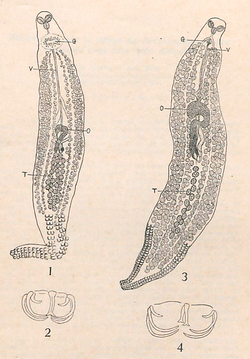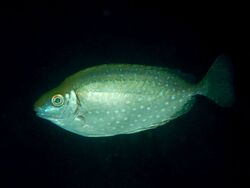Biology:Microcotyle aigoi
| Microcotyle aigoi | |
|---|---|

| |
| Microcotyle aigoi, body and clamp (left); the other species (right) is Microcotyle mouwoi | |
| Scientific classification | |
| Domain: | Eukaryota |
| Kingdom: | Animalia |
| Phylum: | Platyhelminthes |
| Class: | Monogenea |
| Order: | Mazocraeidea |
| Family: | Microcotylidae |
| Genus: | Microcotyle |
| Species: | M. aigoi
|
| Binomial name | |
| Microcotyle aigoi Ishii & Sawada, 1937
| |
Microcotyle aigoi is a species of monogenean, parasitic on the gills of a marine fish. It belongs to the family Microcotylidae.[1][2]
Morphology
Microcotyle aigoi is 2-3.7 mm in length and 0.2-0.4 mm in width [2] and has the general morphology of all species of Microcotyle, with a flat body, comprising an anterior part which contains most organs and a posterior part called the haptor. The haptor is symmetrical and bears a number of clamps, arranged as two rows, one on each side. The clamps of the haptor attach the animal to the gill of the fish. There are also two small buccal suckers at the anterior extremity. The digestive organs include an anterior, terminal mouth, a muscular pharynx, and a posterior intestine with two lateral blind-ending branches. Each adult contains male and female reproductive organs. The reproductive organs include an anterior genital atrium, with spines, a dorsal vagina, a single ovary, and a number of testes which are posterior to the ovary.
Etymology
The species name aigoi is after the Japanese name of the host fish, Aigo.[2]
Hosts and localities
The type-host is the Mottled spinefoot Siganus fuscescens (Siganidae) and the type-locality is off Japan .[2] In the same paper, Ishii and Sawada also described another species, Microcotyle mouwoi, also from Siganus fuscescens and from another fish.[2]
References
- ↑ 石井信太郎・澤田利貞 (1937). 外部寄生性吸蟲類ノ研究. 日本寄生虫学会記事 9: 93-97. (Ishii, N. and Sawada, T. (1937). [Studies on the ectoparasitic trematodes]. Nihon Kiseichū Gakkai Kiji 9: 3-97. [In Japanese])
- ↑ 2.0 2.1 2.2 2.3 2.4 Ishii, Nobutaro, & Sawada, Toshisada (1938). Studies on the ectoparasitic trematodes. Livro jubilar do Professor Lauro Travassos. Editado para commemorar o 25 anniversario de suas actividades scientificas (1913-1938). pp.231-243. Rio de Janeiro. doi:10.5962/bhl.title.111642

Wikidata ☰ Q59388794 entry
 |


